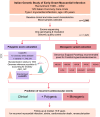Polygenic Prediction of Recurrent Events After Early-Onset Myocardial Infarction
- PMID: 39611259
- PMCID: PMC11651354
- DOI: 10.1161/CIRCGEN.124.004687
Polygenic Prediction of Recurrent Events After Early-Onset Myocardial Infarction
Abstract
Background: Myocardial infarction (MI) is a complex disease caused by both lifestyle and genetic factors. This study aims to investigate the predictive value of genetic risk, in addition to traditional cardiovascular risk factors, for recurrent events following early-onset MI.
Methods: The Italian Genetic Study of Early-Onset Myocardial Infarction is a cohort study enrolling patients with MI before 45 years. Monogenic variants causing familial hypercholesterolemia were identified, and a coronary artery disease polygenic score (PGS) was calculated. Ten-fold cross-validated Cox proportional hazards models were fitted sequentially including all clinical variables, the PGS, and monogenic variants on the composite outcome of cardiovascular death, recurrent MI, stroke, or revascularization.
Results: During a 19.9-year follow-up, 847 (50.7%) patients experienced recurrent events. Each 1-SD higher PGS was associated with a 21% higher hazard of recurrent events (hazard ratio, 1.21 [95% CI, 1.13-1.31]; P=4.04×10-6). Except for secondary prevention, PGS was the strongest determinant of recurrent event risk (C index, 0.56 [95% CI, 0.54-0.58]) compared with clinical risk factors. Overall, predictive performance of clinical risk factors (C index, 0.69 [95% CI, 0.67-0.71]) improved after adding the PGS (C index, 0.69 [95% CI, 0.68-0.71]; P=0.006). When dividing the population by PGS quintiles, the highest fifth had a 57% higher hazard of recurrent events than the lowest fifth (hazard ratio, 1.57 [95% CI, 1.26-1.96]; P=5.57×10-5).
Conclusions: When compared with other clinical risk factors, PGS was the strongest predictor of event recurrence among patients with an early-onset MI. Though the discriminative power of recurrent event prediction in this cohort was modest, the addition of PGS significantly improved discrimination.
Keywords: cardiovascular diseases; coronary artery disease; genetic risk score; genetics; heart disease risk factors.
Conflict of interest statement
Dr Natarajan reports research grants from Allelica, Amgen, Apple, Boston Scientific, Genentech/Roche, and Novartis; personal fees from Allelica, Apple, AstraZeneca, Blackstone Life Sciences, Creative Education Concepts, CRISPR Therapeutics, Eli Lilly & Co, Foresite Labs, Genentech/Roche, GV, HeartFlow, Magnet Biomedicine, Merck, and Novartis; scientific advisory board membership of Esperion Therapeutics, Preciseli, and TenSixteen Bio; scientific cofounder of TenSixteen Bio; equity in MyOme, Preciseli, and TenSixteen Bio; and spousal employment at Vertex Pharmaceuticals, all unrelated to the present work. Dr Honigberg reports consulting fees from CRISPR Therapeutics and Comanche Biopharma, advisory board service for Miga Health, and grant support from Genentech, all unrelated to the present work. Dr Inouye is a trustee of the Public Health Genomics Foundation, a member of the Scientific Advisory Board of Open Targets, and has a research collaboration with AstraZeneca PLC, which is unrelated to this study. Dr Butterworth reports institutional grants from AstraZeneca, Bayer, Biogen, BioMarin, Bioverativ, Novartis, Regeneron, and Sanofi. The other authors report no conflicts.
Figures




References
-
- Inouye M, Abraham G, Nelson CP, Wood AM, Sweeting MJ, Dudbridge F, Lai FY, Kaptoge S, Brozynska M, Wang T, et al. ; UK Biobank CardioMetabolic Consortium CHD Working Group. Genomic risk prediction of coronary artery disease in 480,000 adults. J Am Coll Cardiol. 2018;72:1883–1893. doi: 10.1016/j.jacc.2018.07.079 - PMC - PubMed
-
- Guarischi-Sousa R, Salfati E, Kho PF, Iyer KR, Hilliard AT, Herrington DM, Tsao PS, Clarke SL, Assimes TL. Contemporary polygenic scores of low-density lipoprotein cholesterol and coronary artery disease predict coronary atherosclerosis in adolescents and young adults. Circ Genom Precis Med. 2023;16:480. doi: 10.1161/CIRCGEN.122.004047 - PMC - PubMed
MeSH terms
Grants and funding
LinkOut - more resources
Full Text Sources
Medical

